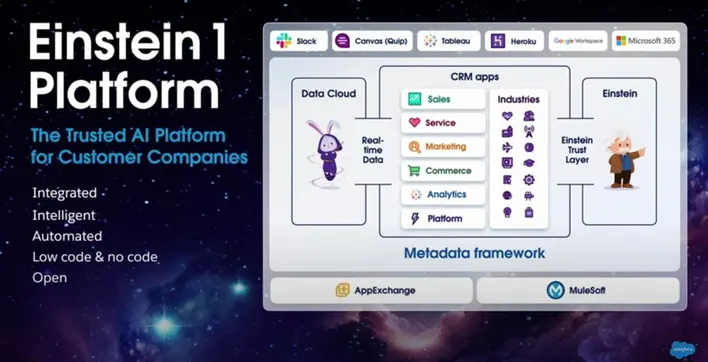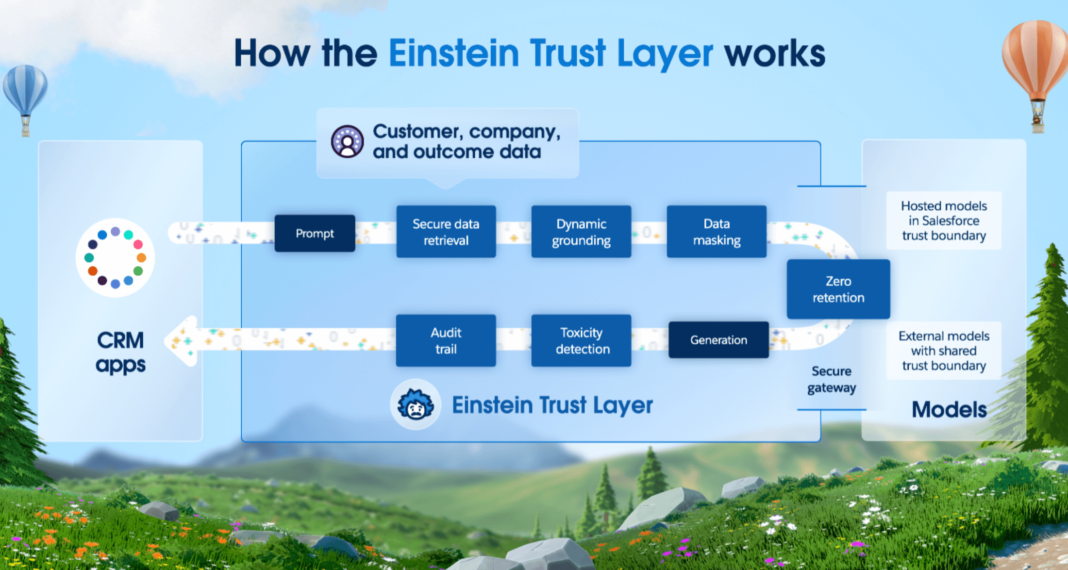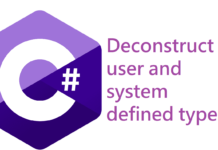In this post I’ll go over my highlights of a huge event that took part some months ago – Salesforce Dreamforce 2023. Many announcements are interesting like Marketing Cloud and Commerce Cloud being integrated into the Einstein 1 platform. I believe for Commerce Cloud this means only the B2B and D2C products… at least for now 🙂. I’ll focus on the B2C side of Commerce Cloud, although most features were announced for B2B and D2C.
You can also watch Salesforce Keynote highlights of the event.
Einstein 1 Platform


Salesforce announced the Einstein Trust Layer which seems to be their focus of what’s behind the Einstein 1 Platform. This makes sense since Salesforce’s core value is trust, this product might be the core that separates Salesforce AI functionality from other solutions. I’m very interested in learning more about each specific part they announced, like data masking, zero retention, and dynamic grounding. We should know what prompt is sent to the LLMs, how the CRM and other enterprise data are used in prompts (for dynamic grounding), and how exactly zero retention is implemented in each LLM provider (e.g. OpenAI). It’s great seeing a slide explaining Einstein Trust Layer makes sure the prompt is not used by the LLMs to train their model, but I think it’s important to challenge these claims and ask questions 🙂.
It would also be interesting to try and connect external models or cloud services, like LAMA, Amazon SageMaker or Azure OpenAI service. This way we take advantage of the middleware inside the Trust Layer that guarantees security and input moderation. As partners, we have access to some Salesforce events and I definitely recommend attending “AI & Einstein Office Hours” on Tuesdays. Claudio Moraes from Salesforce is sharing extremely useful information about Einstein GPT, the details of the Trust Layer, and more AI topics!
Here are some interesting videos that Salesforce has already done, explaining further the Einstein Trust layer and Einstein GPT:
Einstein Copilot
Well… as you know, 2023 was the year of copilots. Salesforce is also taking advantage of that wave and has introduced Einstein Copilot and Einstein Copilot Studio. This looks a lot like what they announced some time ago, Einstein GPT.
I think it’s great that Einstein is more integrated across various products, especially Commerce and Service Cloud. Facilitating the manual work that the business has to do in various merchandising operations only brings benefits.
Generative AI in SFCC Page Designer
About generative Page Designer that they announced, we could simply say “yup, LGTM” and simply use it… but I do have some questions that need answering 😅. The demo they showed looks good and it’s probably a feature that brings tons of value to a lot of customers. But watching it made my mind go through endless questions. At first glance it’s amazing, we could really speed up the development of new components. UI/UX designers, merchandisers, and other business profiles can ask an AI to generate a component without a dev.
Still, I think as a developer we need to understand what is happening underneath, where is the generated code saved, what is the prompt used to generate the component, does it have context of the whole codebase, etc. This might have been the most interesting announcement and something to watch out for. However, we must also criticize and understand the limitations of this technology. In the demo they created, the user enters a brief description of the layout and content they want in the component, then the code is generated in React (it also supports ISML). I don’t believe React is actually used in SFRA, only in the Headless architecture, so their demo raises some questions about how it works underneath.
But anyway, I look at this as if it were v0.dev, that is, the 1st version or v0 of a component. The business or UI designers can experiment and generate several iterations of a component with this functionality, and then paste the generated code into a user story in a scrum board for a developer to retrieve. But it would just be a v0, something to be iterated over before going to production. I don’t think we’re ready yet for generative AI to know the website’s design system, know what caching considerations to apply to the component, have context about the logic behind add to cart if it’s integrated with a 3rd party vendor, etc. But we could also be optimistic and in all the use cases where gen AI struggles, it’s only going to improve.
Note: Page Designer’s Generative AI is expected to launch in beta in February 2024.
Commerce Concierge
Salesforce also announced a new product that is in beta called Commerce Concierge. Basically, the product is centered on the concept of Conversational Commerce. We can integrate our e-commerce website into WhatsApp as if it were one of those ChatGPT plugins that allow you to make purchases on a website.
For example, a customer takes a photo of a product and asks if there is a store with stock so they can make the purchase. If the customer happens to make a purchase on WhatsApp, the bot can respond with new product suggestions trying to effectively cross-sell. Technically, Commerce Concierge uses APIs from Commerce Cloud, Service Cloud, Data Cloud, and the AI layer with Einstein GPT. At the moment I think it will only be launched for Commerce B2B and not B2C. This makes sense to me since it is easier to integrate Clouds that are already within the Salesforce Core Platform… but I hope we have this for SFCC in the future 🙂. I also think it will be possible to expand to more touchpoints, not just WhatsApp.
It’s also important to be aware of new attack vectors. Innovation is awesome and we should strive for more and tinker with these new capabilities. However, innovation can bring new security concerns. In these apps that will be available straight from WhatsApp or our storefront, we should be aware of Prompt injection, Jailbreaking, etc.
Conclusion
It was a great event and I can’t wait to get my hands on some Einstein GPT features for B2C! Hopefully, there will be more features on SFCC that are only available for customers of B2B and D2C 🙏. For example generating product descriptions or commerce intelligence 🙂.
Generating product descriptions with Einstein seems to be really useful if we have a batch of new products that we want to launch. It would be great to have this available in an HTTP API, so that we could integrate this functionality in use cases where our PIM (Product Information Management) is a custom system, or just use them in SFCC. Again… for now some features are only on B2B and D2C side of the commerce products (the ones integrated in Salesforce Core Platform).
If you’re interested in learning about session management in SFCC read this blog post.


![[FIX] BizTalk Server 2010, 2013, 2013 R2 & 2016 errors “Class not registered (WinMgmt)” or “Access denied”](https://blogit.create.pt/wp-content/uploads/2018/07/access-black-and-white-blur-270514-218x150.jpg)



















